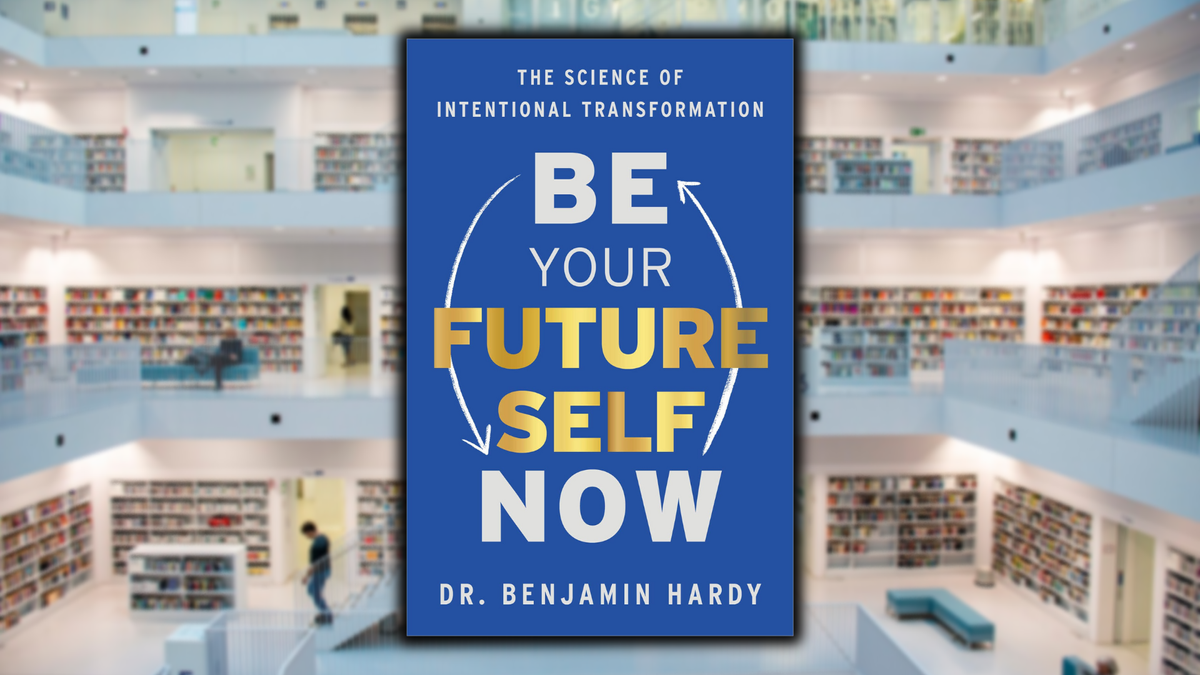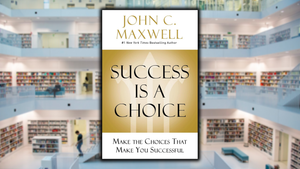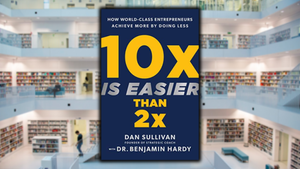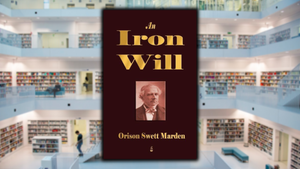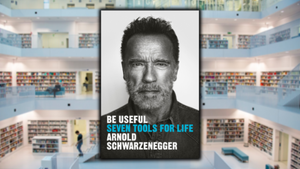
This Book is For:
*People who want to develop a compelling vision for their future and imagine a better life for themselves, while receiving the support and guidance to get there as fast as possible
*Anyone who wants to change the meaning of their past by imagining it as the stepping-stone to a greater future
*Individuals who want to learn how to use their imagined future as an invitation to live more fully in the present
*People who wish to gain clarity and focus, and who want a step-by-step plan for taking control of their life's trajectory and pulling themselves towards the accomplishment of their biggest goals
Summary:
“Assume the consciousness of being the one you want to be, and you will be saved from your present state."
-Neville Goddard
Dr. Benjamin Hardy is the world's leading expert on the science of prospection and the Future Self concept.
Be Your Future Self Now is one of the absolute best introductions to the field, and inside this book you're going to learn exactly why having a vision for your own future development is so critically important. But you're also going to receive practical instruction on how to apply the science here and now to make your actual life better. Immediately. Today.
This is a rather long breakdown, so I'll keep this section short, but basically, who and what you're becoming - and your thoughts about it - directly affect the quality of your experience in the here and now.
Not only that, but when your imagined Future Self directs your behavior rather than your behavior being directed by your past, that can be the shift that changes your entire life's trajectory. Instead of running away from something you don't want (pain in your past), you'll be moving toward an exciting future that gives meaning to all of your subsequent days. To this day.
The book is structured in three parts: first, we cover the seven Threats to your Future Self, then seven Truths about reality and your Future Self, and then we move on to the seven Steps you can take to align your thinking and actions with the person you most want to be.
You don't have to wait for some distant day to be the person you love being. In fact, if you're always "trying" to become your Future Self, you'll never get there. You'll always be your current self, trying to become someone else. But if you are your Future Self now, you don't have to wait.
The time is going to pass anyway, and you may as well use it to become the best version of yourself. The future will always be uncertain, but one thing will always remain true, and that is that regret for a life only partially lived is the ultimate pain.

Key Ideas:
This section looks a little bit different than the Key Ideas sections of other book breakdowns, and that's because Dr. Hardy has helpfully provided a perfect framework for understanding the key ideas in his book.
Here we cover the seven Threats to the realization of your Future Self, the seven Truths about your Future Self, and finally, the seven Steps you must take in order to fully realize your Future Self.
It actually looks a little bit like Dante's path in the Divine Comedy, where he first descended into the deepest depths of Hell, rose through Purgatory, and then ascended into Paradise. The Threats, Truths, and Steps work almost in the same way. So, let me be your Virgil as we travel the path to your Future Self.
Let's begin...
THREAT #1: Without Hope in Your Future, Your Present Loses Meaning
“The first and most fundamental threat to your Future Self is not having hope in your future. Without hope, the present loses meaning. Without hope, you don't have clear goals or a sense of purpose for your life. Without hope, there is no way. Without hope, you decay."
If nothing matters anyway and you have no hope of improving your circumstances, why do anything? Why put forth any effort whatsoever? Without hope in the possibility of creating a better future, you will lose any motivation to take action now. If nothing matters in the future, why would you think anything matters now?
So this is the first and most fundamental threat to your Future Self and one that will stop your journey before it even gets started.
To combat this threat, you need two things: a will, and a way. You need to possess the will to create meaning in your future (and thus your present), and you need to have faith that you will find a way.
We make the path by walking, and you don't have to see the end before you begin. Even holding out the possibility of hope in your future can be enough to get you going, and that, coupled with the absolute faith that you will eventually find a way, will combine to combat this first and most fundamental threat.
THREAT #2: A Reactive Narrative About Your Past Stunts Your Future
“We reinterpret or reconstruct our memory in light of what our mental set is in the present. In this sense, it is more accurate to say the present causes the meaning of the past, than it is to say that the past causes the meaning of the present."
-Brent Slife
What you believe about the present impacts what you believe about your own past. You can choose either to see your past as something that happened to you, or as something that happened for you; for you as in, fuel for your continued development. The second viewpoint is the most empowering, and it's not even close.
The story you tell yourself about your past affects how you think and behave in the present, which has real and specific consequences for what happens in your future.
In a previous book, The Gap and the Gain, Dr. Hardy discusses the difference between being in the "gap," by which he means the space between where you are now and where you want to be, and the "gain," by which he means everything you've transcended and learned from to get where you are today.
Spend as much time as possible in the gain, and see every experience - especially the challenging ones - as the experiences that molded you into the person you are today, and gave you the strength and the skills to turn you into who you wish to become in the future.
THREAT #3: Being Unaware of Your Environment Creates a Random Evolution
“If you’re around people who have low expectations for you, you'll fall to those standards. If you're around people with high expectations, you'll rise to those standards."
No one succeeds or fails alone, and it's for this reason that it is incredibly important to be intentional and discerning when it comes to whom you spend time with, which books you read, what you think about, etc. We create our environment, and then our environment creates us.
The Pygmalion Effect is the term used to describe how others' expectations of us subtly influence our actions and overall behavior, and it's constantly operating within all of our social environments.
We almost can't help taking on the qualities and character of the people and things we spend the most time with, and so if you're 100 percent committed to arriving at a better future, you need to enter and sustain a better environment.
THREAT #4: Being Disconnected from Your Future Self Leads to Myopic Decision
“The more conscious you become of how everything you do right now impacts the person you are in the future, the better and more thoughtful your actions will be."
Your Future Self is a real person. You are creating them in this very moment, and eventually, the future that you're imagining now will become the present - and you will have to live in it.
Seeing your Future Self as a real person to whom you have a moral obligation to make their life better is how you create a "future present" that you will come to love. It's actually very similar to Jordan Peterson's advice to "treat yourself as though you were someone you were responsible for helping." A powerful, powerful concept.
When you're connected to your Future Self by bonds of love, every sacrifice you make for them isn't really a sacrifice - it's an investment in their future happiness and flourishing. When you develop empathy for your Future Self and genuinely want the best for them, you're free to make better, healthier, wiser decisions in the here and now.
THREAT #5: Urgent Battles and Small Goals Keep You Stuck
“The way to slow time down and really make progress is to lift your gaze and begin thinking much bigger and further out."
There's an old story about a guy who dived into a raging river in order to save someone who was drowning. Once he had pulled the first person onto shore, he noticed a second person who was also drowning, and so he went back in to save them, whereupon he saw a third person he had to save, and so on. Not once did it occur to him, instead of diving in, again and again, to go upstream, and find out who was throwing all these people into the river!
Our lives are like this as well, sometimes, when we're so consumed by the small, daily emergencies that we all have to deal with and we never take the time to lift our gaze and take the long view.
Thus, the fifth threat that you must defeat on your way to actualizing your Future Self is the constant preoccupation with the urgencies of today, at the expense of the opportunities of tomorrow.
The solution is to think bigger, dedicate yourself to higher standards of achievement, and thus force yourself to adapt at that level instead of staying stuck and playing small.
THREAT #6: Not Being in the Arena is Failing by Default
"It is not the critic who counts; not the man who points out how the strong man stumbles, or where the doer of deeds could have done them better. The credit belongs to the man who is actually in the arena, whose face is marred by dust and sweat and blood; who strives valiantly; who errs, who comes short again and again, because there is no effort without error and shortcoming; but who does actually strive to do the deeds; who knows great enthusiasms, the great devotions; who spends himself in a worthy cause; who at the best knows in the end the triumph of high achievement, and who at the worst, if he fails, at least fails while daring greatly, so that his place shall never be with those cold and timid souls who neither know victory nor defeat."
-Theodore Roosevelt
Contrary to what Homer Simpson once said, "default" is not "the two greatest words in the English language." A life lived on the default setting is necessarily a smaller life than you're capable of living, and it is the sixth existential threat to your Future Self.
"Inside the arena," so to speak, is where all progress is made. You can't develop your capabilities on the sidelines, and since mastery takes a long time to achieve, any delays that you experience limit your potential by giving you less time with which to work.
Success is exponential, with the tail end being where the compound effect takes over and all the massive gains are realized. But if you don't even start, you're not giving yourself enough runway in order to allow the compound effect to take over and accelerate your results.
THREAT #7: Success is Often the Catalyst for Failure
“With growing success comes growing complexity. In the beginning, you were just focused on your passion or craft. But then, so many other opportunities far beyond the life of your former self enter the equation such as managing money, time, and key relationships. Each decision must be filtered quickly to avoid paralysis by analysis.
As your focus and long-term vision are squeezed out by short-term wins, the original singular goal becomes muddled and distracted. Flow and focus drown if you can't manage and filter complexity.
What truly matters becomes harder to discern as you work harder but no longer make the massive progress you once knew. As time and attention spread thin, this lack of clarity and focus inevitably leads to downfall."
It's a familiar story: a surprisingly high number of former elite athletes go completely broke within years of retiring from their chosen sport. That's because they stop practicing what made them elite in the first place, or they never learned the money management skills necessary to hold onto their fortune after the high money-making years were over.
But this idea extends to much more than just money, which is simply the most salient example. Once people become generally successful, they stop doing the things that made them successful in the first place, thus dooming them to slide down into insignificance and hardship.
Don't let this happen to you! The athletes of life who keep winning year after year after year are the ones who never stop practicing the fundamentals.
TRUTH #1: Your Future Drives Your Present
“You can expect the future to take a definite form or you can treat it as hazily uncertain. If you treat your future as something definite, it makes sense to understand it in advance and to work to shape it. But if you expect an indefinite future ruled by randomness, you will give up trying to master it."
-Peter Thiel
All human behavior is driven by goals, and if you don't prioritize your life, someone else will. I'm sort of smashing together the ideas of both Dr. Hardy and Greg McKeown in that last sentence there, but it's true: the vision you have for your future - your goals - influences what you do today, and if you don't have goals, your present will remain chaotic and messy, not to mention unsatisfying.
Whatever you believe your future will look like influences the actions you take or don't take in the present. So give your future a definite form in your mind. It will almost inevitably look different as you move toward that future, but you can shape and refine that vision as you pull yourself closer to it.
TRUTH #2: Your Future Self is Different Than You Expect
“Despite acknowledging major changes in themselves over the previous 10 years, people consistently assume only minor changes in themselves over the coming decade."
The End of History Illusion is the name given to the tendency of human beings to believe that all the changes that are going to happen have already happened. I'm often guilty of this as well when I read history books and forget that someone else will write a history book about the time period I'm living in now.
What a wild idea to think about! But it's true: history moves along at a rapid pace, and we change along with it. In one sense, trying to predict what you'll want 30 years from now is like having a stranger make decisions for you. That doesn't mean you shouldn't make any long-term plans, but you should also realize that you will change, grow, and evolve as you move forward in life.
TRUTH #3: Your Future Self is the Pied Piper
“The more you put your Future Self in debt in terms of health, learning, finances, and time, the more painful and costly will be the eventual toll."
Long story short, "the piper always gets paid." That means that all of our actions have consequences (and rewards, of course), and we have to be cognizant of that if we want to make the best decisions about what to do now.
Dr. Hardy explains that everything you do can be categorized as either a cost to or an investment in your Future Self. Eventually, all of those costs and investments add up to the Future Self that you can't help being. We create our Future Selves in the here and now with the choices we make.
There's a saying that I love and it goes like this: "Hard choices, easy life. Easy choices, hard life." What it means is that if we do the difficult thing today, and take the harder path today, we will be rewarded tomorrow. Conversely, when we take the easy way out today - when we skip workouts, when we fill our precious bodies with garbage, etc. - we end up facing heavy consequences later.
Another related saying that I also love is: "The chains of habit are too light to be felt, until they are too heavy to be broken." It means that not all those costs and investments seem like they're having any impact in the moment. But across time, given enough repetitions, everything catches up to you - both the good and the bad.
TRUTH #4: The More Vivid and Detailed Your Future Self, the Faster You'll Progress
“The detail and vividness of your Future Self determine your ability to achieve it. The more detailed your Future Self, the better. The more measurable and specific your goals and milestones, the more effective will be your process and progress."
Threat #5 was a warning about not having a larger vision for your life, and this Truth reflects the idea that without that vision, without measurable metrics for success, and without clear mile markers along the way, your progress will be slower than it could be.
The artist Michelangelo once said about one of his creations, "I saw the angel trapped inside the marble and carved until I set him free." You have to "see the angel in the marble," so to speak, and pull yourself toward that vivid, detailed representation of your ideal future.
Along the way, there will be setbacks and stunning victories. You won't be able to jump from here to there - you still have to hack away at the marble for a very long time. To keep yourself motivated, however, you need to know exactly what your next steps are, and what your immediate goal is - your "contextual purpose," as we'll discuss in Step #1 below.
TRUTH #5: Failing as Your Future Self is Better Than Succeeding as Your Current Self
“If you want to become your desired Future Self, play at their level as quickly as possible. Commit at the level of your Future Self. Adapt at the level of your Future Self. Your current self is clearly not there yet, and will therefore need serious training, humility, and feedback."
A long time ago, when I was an amateur boxer, my coaches always had me spar with professional fighters who were infinitely more talented than I was. At the time it sucked, because I'm pretty sure I lost every single round! There's one guy I remember sparring with, Custio Clayton, who ended up representing Canada at the 2012 Olympics - I must have gone dozens of rounds with Custio and I probably hit him like 4 times...combined.
The point of this story is that my Future Self is a much better boxer than my Current Self. Crucially, however, if my Current Self only fights people who are at my level, then I'll never improve.
Sure, I could fight people with roughly the same level of skill as I have, but then I would never reach my full potential. As an amateur, I was willing to "invest in loss" (Hardy's term) and seek out "desireable difficulties" in my training.
I was willing to look awful in training (I'm so, so happy that there's no surviving video of those times!) in order to elevate my skills exponentially. And guess what? When it came time to fight an actual heavyweight fight against someone with roughly the same level of experience as I had, I won by unanimous decision.
The lesson is that investing in loss is how you become a winner over time. Seek out stretch goals that are just above what you're capable of overcoming right now, and you will grow into the Future Self capable of working through them. Without pushing yourself, though, that desirable future will be forever closed to you.
TRUTH #6: Success is Achieved by Being True to Your Future Self, Nothing Else
“It doesn’t matter how accomplished you may be, you cannot be considered 'a success' unless you are true to what you genuinely want or believe."
Everyone wants to "be successful," but that's going to mean seven billion different things to seven billion different people. We each have to play our own game, and the good news is that there are at least seven billion "games" worth playing. We can all be successful; being a winner doesn't necessarily mean that someone else has to lose.
If you wake up in the morning, and for the entire day you're kind and decent to everyone you meet, and you only do the things that make you feel good when you look at yourself in the mirror, then you're already successful.
It's freeing to know that no one else can "give us" success, or confer that status upon us. It is completly up to us.
Now, obviously, in some pursuits you are competing against others and you will be more or less successful depending on where you end up in the ranking system in that particular pursuit. Obviously. But life is so much bigger than any one small slice of it, and a full life is made up of many parts.
Ultimately, you're successful the moment you begin to live life on your own terms and direct yourself toward an exciting future that you can't wait to get to.
TRUTH #7: Your View of God Impacts Your Future Self
“Whatever view you hold of God largely impacts your views of yourself, your nature, your potential, and your trajectory."
This is a more nuanced chapter of the book, and I love the way Dr. Hardy covers it. It's a beautiful conception of God he has (see my Notes below), but what it boils down to is that how you see your place in the universe will affect your actions behaviors within it.
If you believe that death is the end of everything and that nothing will matter in a million years, you're going to think and behave much differently than someone who believes that an infinitely loving God is always watching over them and wants the best for them.
I'll just say this: If someone ever tries to tell you that nothing will matter in million years, you just slap them in the face and tell them, "It's okay, don't be upset - nothing will matter in a million years anyway."
Ok, don't actually do this. But you get the idea!
Just realize that your view of what God is definitely will affect how you think about and behave toward your Future Self, and the difference can be striking. But, as Dr. Hardy writes:
“Each person should be fully respected in what they choose to believe about God, about life, and about themselves. We are all extremely ignorant and limited in our current perspectives, and our Future Selves will see things from a more elevated state."
STEP #1: Clarify Your Contextual Purpose
“People often become blocked when it comes to envisioning their future. It's common to attempt to discover a grand purpose for one's entire life. After all, then you'll be who you really are, and life will be easy and make sense.
Yes, it's nice to have clarity about what you ultimately want for yourself and for your life. But it's also crucial to be open to your values, perspectives, and situation changing. Your Future Self will see things differently than you do now.
In a few years, your Future Self will have a different perspective, and likely have different goals than you do now. Rather than attempting to define your life's purpose, follow Frankl's wisdom. Define for yourself a contextual purpose that you believe to be the absolute most important thing you could do right now. This purpose shouldn't be beyond 10 years out. Even five years away may be a stretch."
Alright, so now we get into the action creation of your Future Self. Crucial to Step #1 is the idea that you definitely do not need to have everything figured out right now. In fact, hardly anyone does. What's better is to clarify a contextual purpose, a smaller purpose that represents what you're most focused on right now.
Dr. Hardy uses the extreme example of Viktor Frankl, whose contextual purpose was to survive the Nazi prison camps of World War II. That was his immediate concern, and so his contextual purpose was to make sure that he survived, and to help as many other people survive as possible.
Later on, his purpose expanded to include helping people find the purpose of their entire lives, but he would never have gotten there in the first place had he not clarified his contextual purpose and made it out of the camps.
To go through this clarification process yourself, there are three key things you need to do.
First, you have to connect with your long-term Future Self - what you want your like to look like in the far future. Then you have to scale it back by identifying your three major priorities. This could be your health, your family, and your career, or anything else that's meaningful to you.
Finally, you set massive (think: huge!) 12-month targets based on your three priorities. Your contextual purpose is to do as well as you can nailing down those three things. Yes, lift your gaze above your current situation to see the bigger picture, but then look down again and dig in.
STEP #2: Eliminate Lesser Goals
“Anything that isn’t taking you toward your Future Self is a lesser goal."
Be single-minded in your focus and your dedication. By definition, anything that doesn't have to do with what you find meaningful in life is meaningless, and you have to eliminate it, to the extent that that's possible.
Of course, "eliminating lesser goals" is extremely difficult to do, and no one is expecting perfection. And also, what about helping others who can do nothing to repay you? Is that a "lesser goal" that needs to be eliminated? Or is it just part of being a good, decent human being?
So there are all kinds of things that may qualify as lesser goals that you may still end up doing - and that's okay. But just realize that committing to something 100 percent is easier than committing 98 percent to that same thing because 100 percent means that you're not giving yourself an option.
STEP #3: Elevate from Needing to Wanting to Knowing
“When you know something is yours, you act differently than if you don't know. A salesperson who knows they are going to make a sale behaves differently than the salesperson who wants to make a sale. If a person knows they're going to get up the next morning and go to the gym, they'll be different from the person who simply wants to. Knowing is an inner experience, a state of acceptance."
The classic example I pull out here is the one of the smoker who says they "want" to quit. Well, I already know that they're not going to make it, because they are identifying as a smoker! They are saying, "I am a smoker," but I want something else. It doesn't work.
Much better to say, "I used to smoke, but I quit." Now your identity is a "former smoker" who doesn't smoke anymore. Big difference.
In much the same way, acting as if your Future Self is an inevitable reality will give you force and vitality that simply wouldn't be available to you had you just "wanted" to be different in the future. Try to feel it inside yourself, the reality of "my Future Self is going to be XYZ," and see how that changes the way you approach the present moment.
STEP #4: Ask for Exactly What You Want
“You get in life what you ask for. Sometimes, you've got to be persistent in your asking. And as you evolve, you'll want better things. You'll hone your clarity about your Future Self. And you'll ask for more specific things that better align with your ever-greater Future Self."
Part of "knowing" (Key Idea above) is being unafraid of asking others what you need from them and how they can help you. Think in such a way that you know deep within you that your request will be granted by somebody, and you'll gain the persistence to keep asking until you eventually ask the right person and you get what you want.
Most people want to help you, but they just don't know how. They won't know what you need and how they can help you if you don't ask them, and you can't expect them to read your mind. It's astonishing what people will say yes to if you just ask.
STEP #5: Automate and Systemize Your Future Self
“To get where you want to go faster and easier, automate and systemize your Future Self. Implementing strategic systems frees up your conscious mind to focus, play, and plan. Automation ensures consistency of results."
In Dr. Hardy's previous book, Who Not How, he explains that there are people all around you who are uniquely qualified to do the things you either can't do, don't want to do, don't have time for etc. As he says, there is a Who for every How, and you don't need to do everything yourself.
Indeed, trying to do everything yourself is grossly inefficient, and that's why you need systems, and templates, and the like. Personally, I delegate as many tasks as I can, and I have written checklists of my daily routines, alongside a typed list of the major things I want to complete or achieve each day.
You don't have to go overboard with this, but it helps to organize your thoughts on paper and get them out of your head. It's crucial to understand, though, that the absolutely perfect system you don't even use is vastly inferior to the slightly imperfect system that you use without fail.
STEP #6: Schedule Your Future Self
"Your time is the clearest indicator of your commitment. You can’t hide how you spend your time.
To improve freedom of money, relationships, and purpose, own your freedom of Time. To have freedom of time, take ownership of your schedule. Prioritize what matters most, and eliminate what does not.
The more you take ownership of your time and attention, the simpler and easier to realize your Future Self. If, however, your time is continually overrun with lesser goals and other people's agendas, then your desired Future Self will be frustrated."
The writer, Annie Dillard, once said that "a schedule is a net for catching days." If something's important to you, then you need to put it in your schedule first, and then schedule everything else around it.
You also need to promise yourself that you will keep that appointment with yourself, just like you would with another person. It's astonishing the good things we'll do for others but deny ourselves.
So take your three priorities (Step #1), and make sure that they have a permanent place in your schedule. Keep that appointment with yourself, and don't go to sleep at night until you've done something to move those three priorities forward.
STEP #7: Aggressively Complete Imperfect Work
“The more you make completion a way of life, the more you become your Future Self. Eighty percent to your current self is beyond anything your former self could ever do. Eighty percent to your Future Self will be beyond anything your current self could do.
Confidence comes from completion. Completion requires commitment. Anyone can start, but few finish. The further you go, the less competition there will be. Most people succumbed to their lesser goals and gave up a long time ago.
Every step you take toward your Future Self puts you in rarer air. Everything you complete teaches you something you'll use for the next project. Become a master of completing and shipping. If you don't, then your Future Self will be an idea but not a fact."
In order to make your Future Self a present reality, you need to become a finisher. You need to be someone who finishes what they start, and who relentlessly ships their work, day after day.
Your work will not be perfect. There will always be something you could tweak or make better or improve in some slight way, but most the time, obsession with such details is just an insidious form of procrastination.
Become a finisher. Take your most important work, and make sure that it sees the light of day. It may not survive "first contact" with the customer or the client or the viewer, etc. But it will done, it will be out there, and you will learn from the feedback you get what you need to improve.
This goes for anything. You don't need to know exactly what you're going to say to your child when you go into their room and ask them about what they were doing after school. You don't need to have some pristine workout plan all laid out before you go to the gym for the first time. You just need to go. You just need to start the conversation. You just need to get started. You just need to ship.

Book Notes:
“Be public about your Future Self, and you’ll immediately stop being consistent with your past.”
“Humans are not driven by the past, we’re pulled forward by the future we’re most committed to.”
“Most people, out of fear, limit their view of the future to a narrow range. Thoughts of tomorrow, a few weeks ahead, perhaps a vague plan for the months to come. We are generally dealing with so many immediate battles that it is hard for us to lift our gaze above the moment. It is a law of power, however, that the further and deeper we contemplate the future, the greater our capacity to shape it to our desires."
-Robert Greene and 50 Cent, The 50th Law
“Being driven by fear is a lower state of consciousness than being driven by courage and vision. Deep emotional development is required to transition beyond fear as your driver to levels of acceptance, courage, and love as reasons for action."
“The quality of connection you have with your own Future Self determines the quality of your life and behaviors now."
“Research shows that the more connected you are to your own Future Self, the wiser decisions you make here and now. Contemplating your Future Self, you're more likely to invest in and set yourself up for an abundant retirement, exercise, and eat healthier, and you're less likely to engage in delinquent or self-defeating acts."
“To make quality decisions, know where those decisions will take you. Decisions and actions are best when reverse-engineered from a desired outcome. Start with what you want and work backward. Think and act from your goal, rather than toward your goal.
Your brain does this automatically. Indeed, neuroscientists now agree the brain is essentially a 'prediction machine,' guiding behavior toward the expected future. Learning is the process of updating and improving our brain's predictions.
The clearer you are on where you want to go, the less distracted you'll be by endless options. When you're disconnected from your Future Self, you get caught up in urgent goals that often result in low-quality behavior in the present. For the majority, this is the norm."
“Being connected to your future self is the secret to being truly present.”
“Author and philosopher, Dr. Stephen R. Covey, said, 'Mental creation always precedes physical creation.' Anyone who has created something substantial did so by seeing it in their mind first, then working toward the image. As they took steps forward, their vision clarified, expanded, and evolved."
“You see what you’re looking for. You see what you care about. What you focus on expands.”
“Your identity is based on the vision you have for yourself. When you change your committed vision, your identity immediately changes, which in turn, immediately changes the flow of your thoughts and behaviors.
Yes, it will require courage to fully embrace your Future Self. Yes, it will sometimes take more time than you anticipated. Yes, there will be obstacles.
But if you're committed, everything you face along the way will only better prepare you for what you truly want. Everything that comes at you will strengthen your resolve. You'll be able to turn any experience to your gain, moving you further and evolving you beyond what you could initially imagine."
NOTES FROM THREAT #1:
“Where there is no vision, the people perish.”
-Proverbs 29:18
“Researchers describe hope as the will and the way. Hope is the will because conscious choosing is involved. You decide a specific end, which you feel is worthwhile and important to create, pursue, or realize. You believe you have agency, and that your decisions matter, and that you can influence the outcomes of your life.
Hope is the way because to have hope, you either see a way to realize your goal, or are flexible enough to create a way. When hope exists, there is always a way. Hope does not consider the odds."
“As Frankl knew, hope is rooted in a clear purpose for your future. A high-hope person, like Frankl himself, remains committed 100 percent to a pursuit, and 100 flexible around the path to achieving their goal."
NOTES FROM THREAT #2:
“Whatever story you choose for your past enormously impacts your present and your future.”
“Emotional health happens when you contain both a positive past and an exciting future. Having a positive past depends very little on what events actually occurred.
What happened to you doesn't matter as much as what story you decide to tell yourself about what happened. What happened to you doesn't matter as much as what emotions you feel about what happened.
Your past is fundamentally a meaning. The story you create about past events dictates what your past means to your present and to your Future Self. We get to choose what story we attach."
NOTES FROM THREAT #3:
“You will be the same person in five years except for the people you meet and the books you read.”
-Charlie Jones
“If we do not create and control our environment, our environment creates and controls us."
-Dr. Marshall Goldsmith
“Between stimulus and response, there is a space. In that space is our power to choose our response. In our response lies our growth and our freedom."
-Viktor Frankl
“Imagination is more important than knowledge.”
NOTES FROM THREAT #4:
“When you truly care about another person, you aren't put off by making sacrifices of your time, energy, and resources for them. You'll sacrifice spending money now so your Future Self can have more money later. You'll sacrifice momentary gratifications to invest in education, health, and relationships.
Moving from liking to loving your Future Self is the difference between sacrificing for someone and investing. When I truly care about something or someone, I happily invest in that thing or relationship."
"I happily make these investments. I want to make these investments, because I know that every time I invest in my Future Self, my life gets better. As you invest in your Future Self, you are more connected to them. You love whatever you invest yourself in. You become committed to whatever you invest yourself in.
Over time, whatever you invest in grows and compounds. Investing in your Future Self brings you closer to that person you are growing into. As you love them more, your Future Self expands exponentially. As your vision of your Future Self grows, your present happiness and motivation increase."
“The more vivid and detailed your Future Self, the more direct can be your process to get there."
“The more detailed the vision, the easier it is to realize.”
NOTES FROM THREAT #5:
“Lift your gaze and begin connecting with your longer-term Future Self. Develop goals that are five years out, and prioritize those big goals before the urgent daily battles."
"A massive threat to your Future Self is simply that you're thinking way too small. Multiply your vision 10-times or 100-times larger. You'll be forced to understand the principles, rules, and strategies of living at a higher level."
NOTES FROM THREAT #6:
“Never take advice from someone you wouldn’t trade places with.”
-Darren Hardy
“He who hesitates is lost.”
-Cato
“The longer you hesitate to enter the playing field, the longer you delay the essential learning curve. You cannot deliberately practice on the sidelines. When you're not in the arena, you're failing by default.
Outside the arena may feel safe, but it's the most dangerous place you could be. While outside, you remain ignorant of your own ignorance. You may be an armchair philosopher on whatever subject you're interested in, but you're not becoming a pro. Staying on the sidelines leads to a life of regrets."
“The longer you wait to enter your arena, the more you limit your Future Self."
NOTES FROM THREAT #7:
“Each of us has an inner thermostat setting that determines how much love, success, and creativity we allow ourselves to enjoy. When we exceed our inner thermostat setting, we will often do something to sabotage ourselves, causing us to drop back into the old, familiar zone where we feel secure."
-Dr. Gay Hendricks
“We are kept from our goal not by obstacles, but by a clear path to a lesser goal."
-Robert Brault
“Becoming successful at what you do is far less difficult than maintaining and expanding that success. In the field of sports, teams that reach the top rarely repeat as champions. Complacent because they've achieved their goal, their focus shifts. Success brings opportunity and distraction, and players stop putting in the focused work and deliberate practice needed to be at the top. When things are going well, it's also easy to get soft and lazy. You stop the disciplines that got you where you're at."
“Hard times create strong men. Strong men create good times. Good times create weak men. And, weak men create hard times."
-G. Michael Hopf
“If you get clear on your Future Self, and invest specifically toward your Future Self, you will become incredibly successful. You'll experience the compound effect in knowledge, skills, money, and relationships. But with this increase in success, you will face surprising complexity.
To guard against collapse requires clarifying your Future Self at each succeeding stage. Success breeds a barrage of distractions and lesser goals. Without remaining clear on what truly matters, you'll become internally divided on what you're committed to."
"Success is a massive threat to your Future Self."
“The ability of the average person could be doubled, if the situation demanded it.”
-Will Durant
NOTES FROM TRUTH #1:
“Many, if not most, goals are reactive to one's environment or situation. The more intentional and proactive you become in your actions, goals, and thinking, the more intelligent and freer you'll be."
“Human beings are intelligent to the extent they are intentional, conscious, and honest about the goals that are driving them."
NOTES FROM TRUTH #2:
“Human beings are works in progress that mistakenly think they're finished. The person you are right now is as transient, as fleeting, and as temporary as all the people you've ever been."
-Dr. Daniel Gilbert
“Most of us can remember who we were 10 years ago, but we find it hard to imagine who we're going to be, and then we mistakenly think that because it's hard to imagine, it's not likely to happen. Sorry, when people say, 'I can't imagine that,' they're usually talking about their own lack of imagination, and not about the unlikelihood of the event that they're describing."
-Dr. Daniel Gilbert
“Most people assume their Future Self won't be much different from their current self. In fact, if a stranger could have a conversation with the person you were 10 years ago, and the person you are today, they'd be talking to two totally different people. Your Future Self will be just as different."
“It is not only accurate to see your Future Self as a different person, it's crucial to living effectively. When you see your Future Self as a different person, you don't get stuck or dogmatic in your current way of thinking. You love your current self, and you appreciate how temporary your current perspectives, attributes, and situation are. You will change and evolve. This is freeing and exciting.
Knowing you can and will change enables you to love your current self. You're less rigid about how you see yourself. You don't need all the answers right now. You don't need to prove your current capability or worth. Your current self is temporary.
This refreshing truth enables a growth mindset, where you're more interested in learning and growing than trying to prove yourself. It creates a flexible identity, where you actively update and alter your perspectives, and continually upgrade how you think, what you measure, and what you value.
The promise of change empowers you to give grace to your current self. You can make mistakes. It's okay that you don't have all the answers. It's okay if you're a bit disorganized and camped in the messy middle. Things will change. If you're committed to a certain change or outcome, then you will figure it out."
NOTES FROM TRUTH #3:
“Rather than putting your Future Self in deeper debt, make your Future Self wealthier. Continually position your Future Self for freedom of time, money, relationships, and overall sense of purpose. An investment toward your Future Self is any conscious action you're making toward chosen goals.
Every time you consciously invest in something specific, whether learning, health, relationships, or experiences, your Future Self grows more capable, free, and mature. Every investment compounds over time, making your Future Self wealthier. The earlier you invest, the more your Future Self compounds."
“The compound effect refers to how small changes compound into dramatic results. It's the ripple effect you get from the choices you make. In life you not only reap what you sow, you reap more than you sow. Everything compounds over time. Little things become big things, for better or worse.
Reading one good book may not change your life. But that one book could lead to the next book, and the next, and the next. Your knowledge and perspectives compound, creating unpredictable changes and results. Over time, you become a different person, and the process started with one book.
Your Future Self is the compounded effect of your actions now."
“The more you invest, the more committed you'll be. The more you invest, the bigger your vision will be. Invest your time, your money, and your talents. Investing is how you shatter the glass ceiling of your current potential and elevate your sense of what you can be and do. This profound behavior signals to your subconscious that you can have and be much more than your current identity."
NOTES FROM TRUTH #4:
“Your Future Self is based on whatever you are actively measuring.”
“Effective progress comes with a combination of measurable metrics, a vivid vision of your Future Self, and clear mile markers. Without these elements, people wander."
“Learn the rules like a pro, so you can break them like an artist.”
-Pablo Picasso
NOTES FROM TRUTH #5:
“The key challenge for aspiring expert performers is to avoid the arrested development associated with automaticity. These individuals purposefully counteract tendencies toward automaticity by actively setting new goals and higher performance standards, which require them to increase speed, accuracy, and control over their actions. The experts deliberately construct and seek out training situations to attain desired goals that exceed their current level of reliable performance."
-Dr. K. Anders Ericsson
“Only through imaging a Future Self with improved skills may we be able to motivate, plan, and execute the honing of skills through deliberate practice."
-Shaping One's Future Self
“No one will know me better than myself 20 years from now. If my goal is unobstructed self-expression or self-actualization within an art, then the person who's teaching me should be the person who knows me most deeply. And that's me 20 years from now."
-Josh Waitzkin
"Being connected with his Future Self is what enables Josh to continually invest in loss. He's connected to a much more evolved version of himself. He's committed to his Future Self more than his current comfort. He’s aggressive about becoming his Future Self.”
"The more willing you are to invest in momentary loss and pain directed at a goal, the faster you'll adapt to the level of your Future Self."
NOTES FROM TRUTH #6:
“Chase the future. Live in the world of tomorrow...It's the most exciting way to live. Every day will be like a child's birthday, with surprising new breakthroughs. It keeps your brain healthy, young, and active. Since everything will always be new, you won't rely on assumptions or habits. You'll pay full attention and keep learning every day."
-Derek Sivers
“We can’t know without knowing a person's aims. What if Richard Branson set out to live a quiet life, but like a compulsive gambler, he just can't stop creating companies? Then that changes everything, and we can't call him successful anymore."
-Derek Sivers
“Anything less than being true to your Future Self is failure."
NOTES FROM TRUTH #7:
“Our deepest fear is not that we are inadequate. Our deepest fear is that we are powerful beyond measure. It is our light, not our darkness that most frightens us. We ask ourselves, 'Who am I to be brilliant, gorgeous, talented, fabulous?' Actually, who are you not to be? You are a child of God. Your playing small does not serve the world. There is nothing enlightened about shrinking so that other people won't feel insecure around you."
-Marianne Williamson
“Any view that removes agency toward your Future Self is limiting.”
10 Rules for Life from the book, If Life is a Game, These Are the Rules, by Cherie Carter-Scott:
#1 - You will receive a body.
#2 - You will receive lessons - you are enrolled in a full-time informal school called "life."
#3 - There are no mistakes, only lessons.
#4 - Lessons are repeated until they are learned.
#5 - Learning lessons does not end - if you're alive, that means there are still lessons to be learned.
#6 - "There" is no better than "here."
#7 - Other people are merely mirrors of you - you cannot love or hate something about someone unless it reflects to you something you love or hate about yourself.
#8 - What you make of life is up to you - you have all the tools and resources you need, and what you do with them is up to you.
#9 - The answers to life's questions lie within you - all you need to do is look, listen, and trust.
#10 - You will forget all of this at birth.
“Our birth is but a sleep and a forgetting:
The Soul that rises with us, our life's Star, Hath had elsewhere its setting,
And cometh from afar: Not in entire forgetfulness,
And not in utter nakedness,
But trailing clouds of glory do we come
From God, who is our home
Heaven lies about us in our infancy."
-William Wordsworth
“It is a serious thing to live in a society of possible gods and goddesses, to remember that the dullest and most uninteresting person you talk to may one day be a creature which you would be strongly tempted to worship...There are no ordinary people."
-C.S. Lewis
“This view of God enables me to look at every person with awe and amazement. Every person has the inherent capacity to become like God. This life is a small step in our evolution. Infinity extends behind us and infinity stretches before us. A person's trajectory is far more powerful and real than their current self."
“Know this, that
ev'ry soul is free
To choose his life
and what he'll be;
For this eternal
truth is giv'n:
That God will force
no man to heav'n.
He'll call, persuade,
direct aright,
And bless with wisdom, love, and
light,
In nameless ways
be good and kind,
But never force the
human mind."
-Elias Smith and Abner Jones (original author unknown)
“God loves and respects us irrespective of what we choose.”
“Each person should be fully respected in what they choose to believe about God, about life, and about themselves. We are all extremely ignorant and limited in our current perspectives, and our Future Selves will see things from a more elevated state."
NOTES FROM STEP #1:
"Simple can be harder than complex: you have to work hard to get your thinking clean to make it simple. But it's worth it in the end because once you get there, you can move mountains."
-Steve Jobs
“Your Future Self is ready for you.”
“If you have more than three priorities, you don’t have any.”
-Jim Collins
“The goal determines the process.”
NOTES FROM STEP #2:
“Commitment requires vigilance. There’s never a time when lesser goals won’t present themselves to you.”
“Your behavior demonstrates what you’re truly committed to.”
NOTES FROM STEP #3:
“Gratitude is powerful when expressed for what has already occurred. It's also extremely powerful when you express proactive gratitude for what you want in the future. Gratitude elevates from wanting to knowing."
“Every little action you take toward your Future Self enhances your level of commitment and knowing. Every little action toward your Future Self is the evidence of your faith. Every little action toward your Future Self is you more fully being your Future Self now."
“Accept and know that what you want is yours, and you can be and do from your goal, rather than to your goal. You know you've already succeeded, and act from the position and mindset of your Future Self. Because you're acting from the goal, rather than toward the goal, your actions are far more powerful and aligned.
Your actions come from your identity. When your identity is rooted in current commitments, rather than your Future Self, your actions are weak and unaligned with your goal.
The only way to realize your Future Self is to be your Future Self now. Be, then do, then have.
Once you accept the truth of your Future Self, and know it's already yours, then your actions align with your vision. Your circumstances change immediately. You see what you didn't previously see. You stop doing what no longer aligns."
“Until one is committed, there is hesitancy, the chance to draw back, always ineffectiveness. Concerning all acts of initiative (and creation), there is one elementary truth, the ignorance of which kills countless ideas and splendid plans: that the moment one definitely commits oneself, then Providence moves too. All sorts of things occur to help one that would never otherwise have occurred. A whole stream of events issues from the decision, raising in one's favor all manner of unforeseen incidents and meetings and material assistance, which no man could have dreamt would have come his way."
-William Hutchinson Murray
NOTES FROM STEP #4:
“You can know you're committed to something when you ask for it. When you ask directly, boldly, and without apology. Start asking, and you'll start receiving. It's startling how fast you'll get what you want once you directly ask."
NOTES FROM STEP #5:
“Clarity in the future creates clarity in the here-and-now.”
“For any challenge, the first thing to do is optimize it. Break it down to its bare minimum, simplify it, and eliminate everything that's not completely necessary...After you've optimized a task, the next step is to automate as much as possible. Use software or processes so you can get the task done without human involvement - just set it and forget it. Finally, for anything that's left, outsource to a generalist or a specialist.
It's important to note that although outsourcing can do a lot for you, it comes after optimizing and automating. If you outsource an inefficient task, that doesn't really help because it's still inefficient. It's much better to eliminate work by optimizing or automating whenever you can and only outsource what's left."
-Ari Meisel
“There is nothing quite so useless, as doing with great efficiency, something that should not be done at all."
-Peter Drucker
“Trying to keep too many options available is a lack of intention and commitment. A fundamental aspect of decision-making is gladly accepting opportunity costs."
“Small changes can create nonlinear and unpredictable shifts throughout the system. This is partially why your Future Self will be far different from what you predict. This is also why systems thinking and systems design are so powerful.
If you're unaware, you could allow a virus that, initially small, could spread and take over the system. Conversely, you could alter the system, blocking inputs and designing for others to automate and compound the results you want.
Introducing small changes into your system can have a dramatic effect. Refining your system to automate your desired results and block noise and decision fatigue is essential to flow and high performance."
NOTES FROM STEP #6:
“Who you think you are informs what you do.”
“To me, 'busy' implies that the person is out of control of their life."
-Derek Sivers
“Your schedule reflects your priorities. Your schedule reflects what you're actually committed to. Most schedules are dominated by urgent battles and lesser goals such as meetings and Zoom calls. Rarely does someone's schedule reflect and prioritize their Future Self over their current self."
“Time freedom is a decision, and is a perpetual refinement.”
“Without question, taking ownership of your time demands commitment and courage. Busy can be a comfort zone despite knowing you're being ineffective. Living busy and trapped in lesser goals allows you to avoid the truth of your Future Self."
“Procrastination is the most common manifestation of Resistance because it's the easiest to rationalize. We don't tell ourselves, 'I'm never going to write my symphony.' Instead, we say, 'I am going to write my symphony; I'm just going to start tomorrow.'"
-Steven Pressfield
"The more important a call or action to our soul's evolution, the more Resistance we will feel toward pursuing it."
-Steven Pressfield
“Choosing freedom over security is an act of courage.”
NOTES FROM STEP #7:
“If you’re planning to do something with your life, if you have a 10-year plan of how to get there, you should ask: why can't you do this in 6 months?"
-Peter Thiel
“If you’re remarkable, it's likely that some people won't like you. That's part of the definition of remarkable. Nobody gets unanimous praise - ever. The best the timid can hope for is to be unnoticed. Criticism comes to those who stand out."
-Seth Godin
“As beautiful as you are, your current self is incredibly limited and ignorant. The best work you can produce now is pebbles to what your Future Self will create. Your Future Self gives you permission to produce."
“Done is better than perfect. Dan Sullivan explained, 'Eighty percent gets results, while 100 percent is still thinking about it.'"
“Prolific is better than perfect.”
“Your Future Self is your greatest guide. They love you more than you love yourself.”

Important Insights from Related Books:
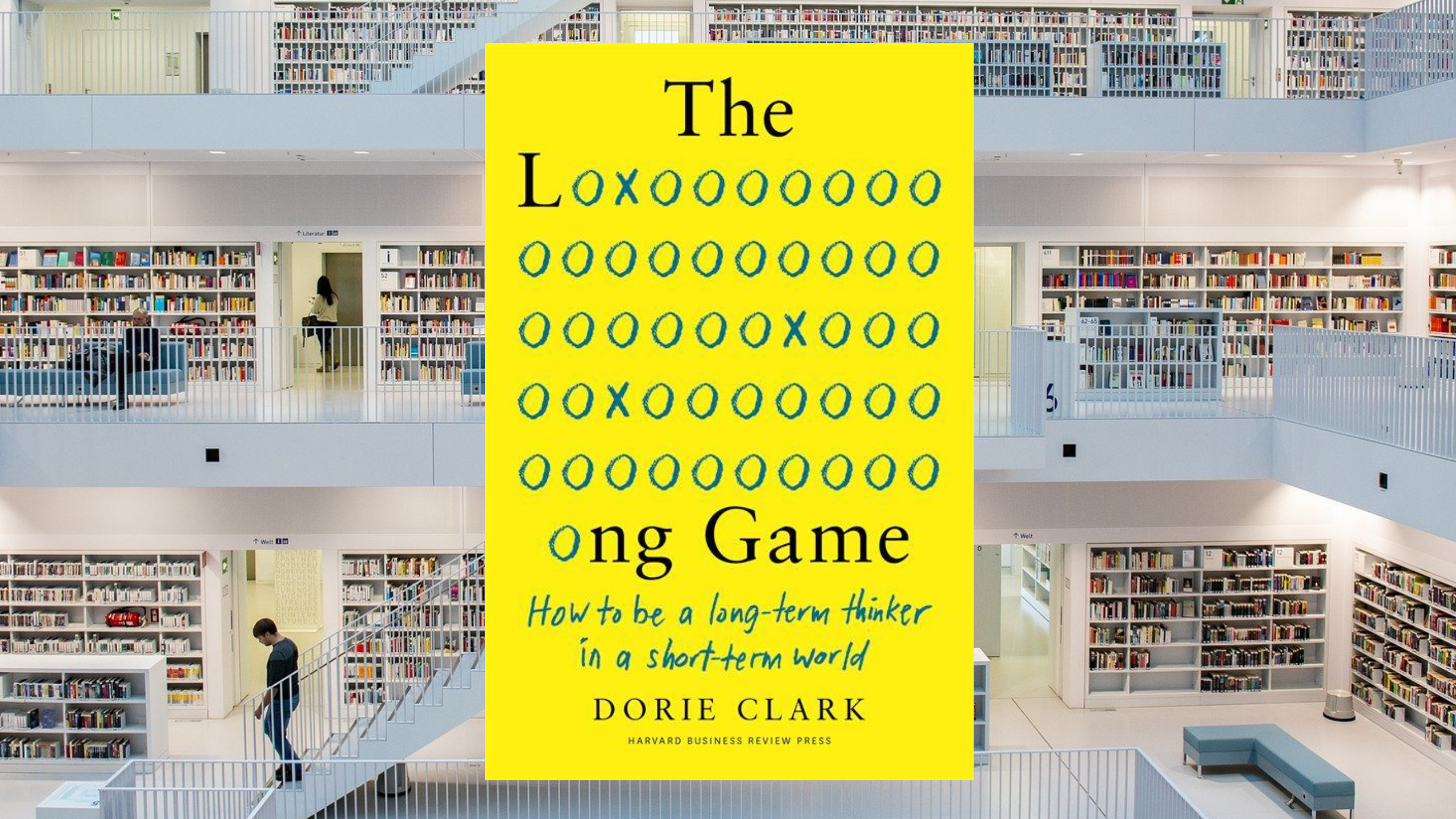
The Long Game, by Dorie Clark:
While the rest of the world thinks we're playing checkers, readers of this book will know that we're actually playing chess instead. The greatest Grand Masters in chess plan many, many moves ahead, and the best players in the game of life tend to do the same thing. That's what The Long Game is all about.
The modern world, however, continues to prioritize short-term gratification over long-term success and fulfillment, and we see evidence of this everywhere. There are the consumer and student debt crises, with people owing thousands of dollars (and sometimes much more) on their credit cards due to poor planning and impulse shopping. There are the billions of hours being wasted each day on mindless social media scrolling and the obesity epidemic overwhelming our healthcare systems worldwide.
What it boils down to is people taking the easy way out, doing what feels good in the moment but leads to nothing but trouble and dissatisfaction in the long term. As they say, "Hard choices, easy life. Easy choices, hard life." Keeping the end in mind and making good short-term decisions is hard, but it's nothing compared to the hardship of looking back on your one and only life with regret.
Sample Quotes from the Book:
“We radically underestimate what we can accomplish in a decade.”
“The whole point of playing the long game is understanding that ridiculous goals are ridiculous right now – not forever. When we force ourselves to take our goals to extremes – What would ultimate success look like? – we can create an honest road map for ourselves. It might take five years, or ten, or twenty. But that time will pass anyway. If a goal is worth pursuing, it’s worth pursuing the version of it we actually want – not one that’s watered down to protect our ego.”
“In the moment, it’s impossible to tell whether it’s not working or whether it’s not working yet.”
Read the Full Breakdown: The Long Game, by Dorie Clark
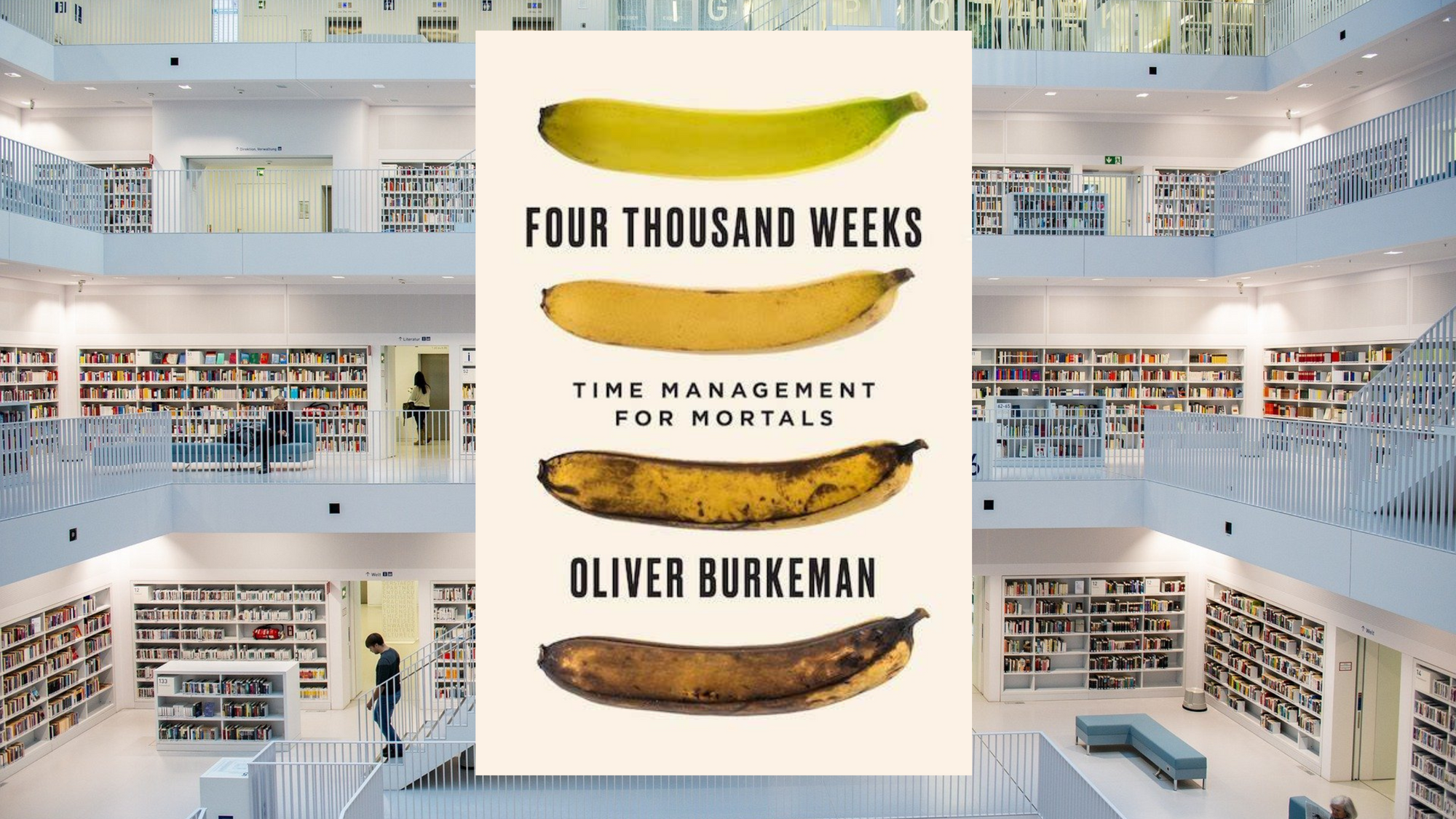
Four Thousand Weeks, by Oliver Burkeman:
Adam Grant said that this is the most important book ever written about time management, and I’m certainly inclined to agree. In the opening pages of Four Thousand Weeks, Oliver Burkeman gets things started with a jolting, yet indisputable claim:
“The average human lifespan is absurdly, terrifyingly, insultingly short...But you? Assuming you live to be eighty, you’ll have had about four thousand weeks.”
Burkeman’s approach to time management has always been the “negative” one, by which I mean operating by negation – eliminating rather than adding. He suggests giving up the very idea that we could ever live up to the impossible expectations imposed on us by ourselves and others, rather than stacking impossible commitments and doomed promises onto an already crumbling structure.
You’re never going to get to a point where you feel like you’re totally on top of everything. The very effort is wearing us out, stressing us out, and leading us to waste our absurdly, terrifyingly short lives on trivia and nonsense.
Sample Quotes from the Book:
“The more you try to manage your time with the goal of achieving a feeling of total control, and freedom from the inevitable constraints of being human, the more stressful, empty, and frustrating life gets.
But the more you confront the facts of finitude instead – and work with them, rather than against them – the more productive, meaningful, and joyful life becomes."
“The world is bursting with wonder, and yet it’s the rare productivity guru who seems to have considered the possibility that the ultimate point of all our frenetic doing might be to experience more of that wonder.”
“The more firmly you believe it ought to be possible to find time for everything, the less pressure you’ll feel to ask whether any given activity is the best use for a portion of your time.”
Read the Full Breakdown: Four Thousand Weeks, by Oliver Burkeman
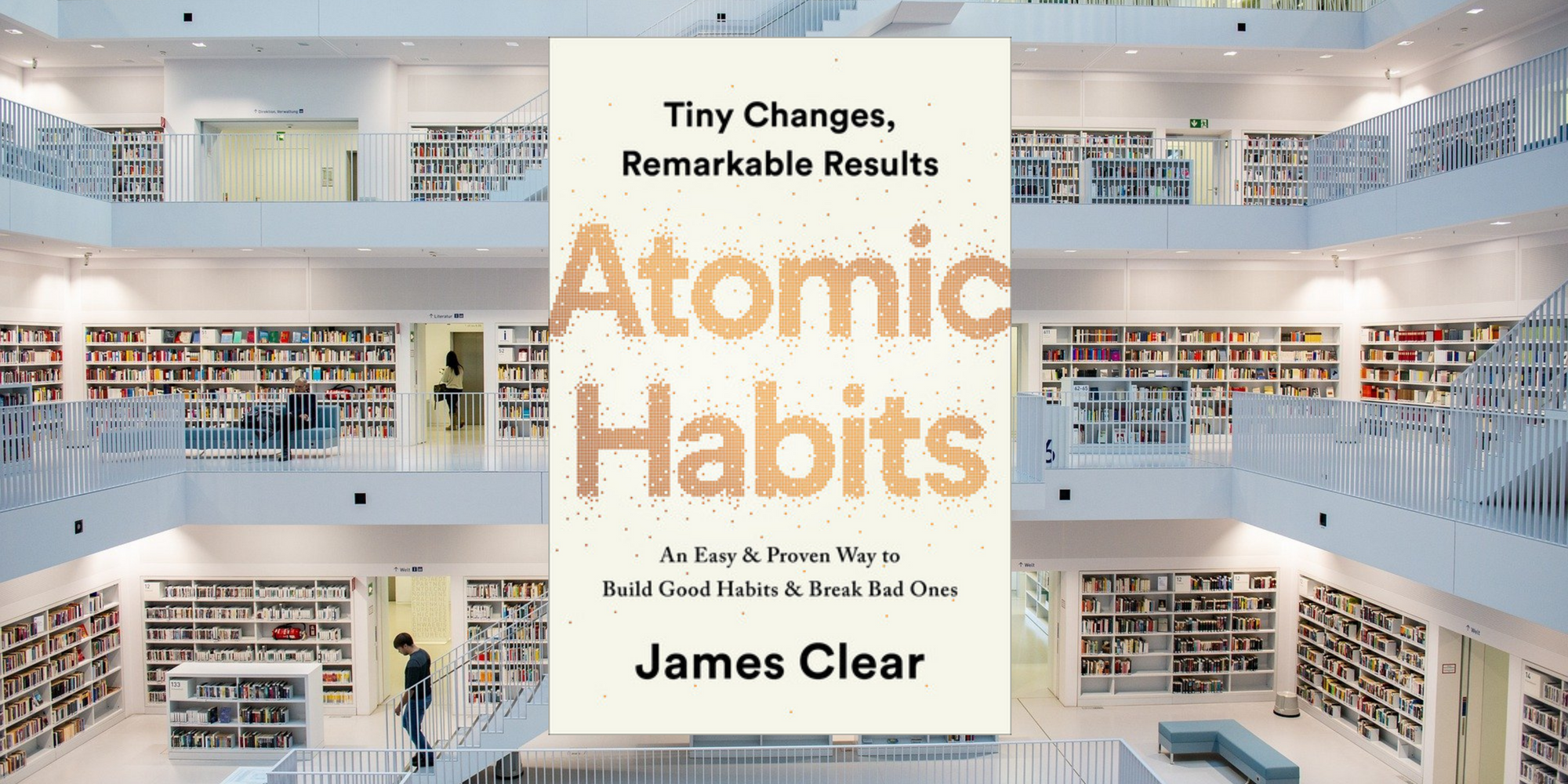
Atomic Habits, by James Clear:
I would call Atomic Habits the definitive book on habits. It’s a 4-million-copy bestseller that I believe has lived up to all the hype, and I ended up with about 8 pages of notes, most of which have been reproduced below. I mean, this thing is packed with everything you need to know in order to set yourself up for every kind of success in the future.
One of the most powerful ideas for me was the idea that we should be far more concerned about our current trajectory than with our current results.
This idea stuck with me so powerfully, in fact, that it still pops into my head, unbidden, more than a year after I first read the book. The fact is that it takes time to get where we want to be in life, but the only thing we have absolute control over is the direction in which we’re heading.
Sample Quotes from the Book:
"The quality of our lives depends on the qualities of our habits."
"Habits are the compound interest of self-improvement. The same way that money multiplies through compound interest, the effects of your habits multiply as you repeat them.
They seem to make little difference on any given day, and yet the impact they deliver over the months and years can be enormous. It is only when looking back two, five, or perhaps ten years later that the value of good habits and the cost of bad ones becomes strikingly apparent."
"If you want to predict where you'll end up in life, all you have to do is follow the curve of tiny gains or tiny losses, and see how your daily choices will compound ten or twenty years down the line."
Read the Full Breakdown: Atomic Habits, by James Clear
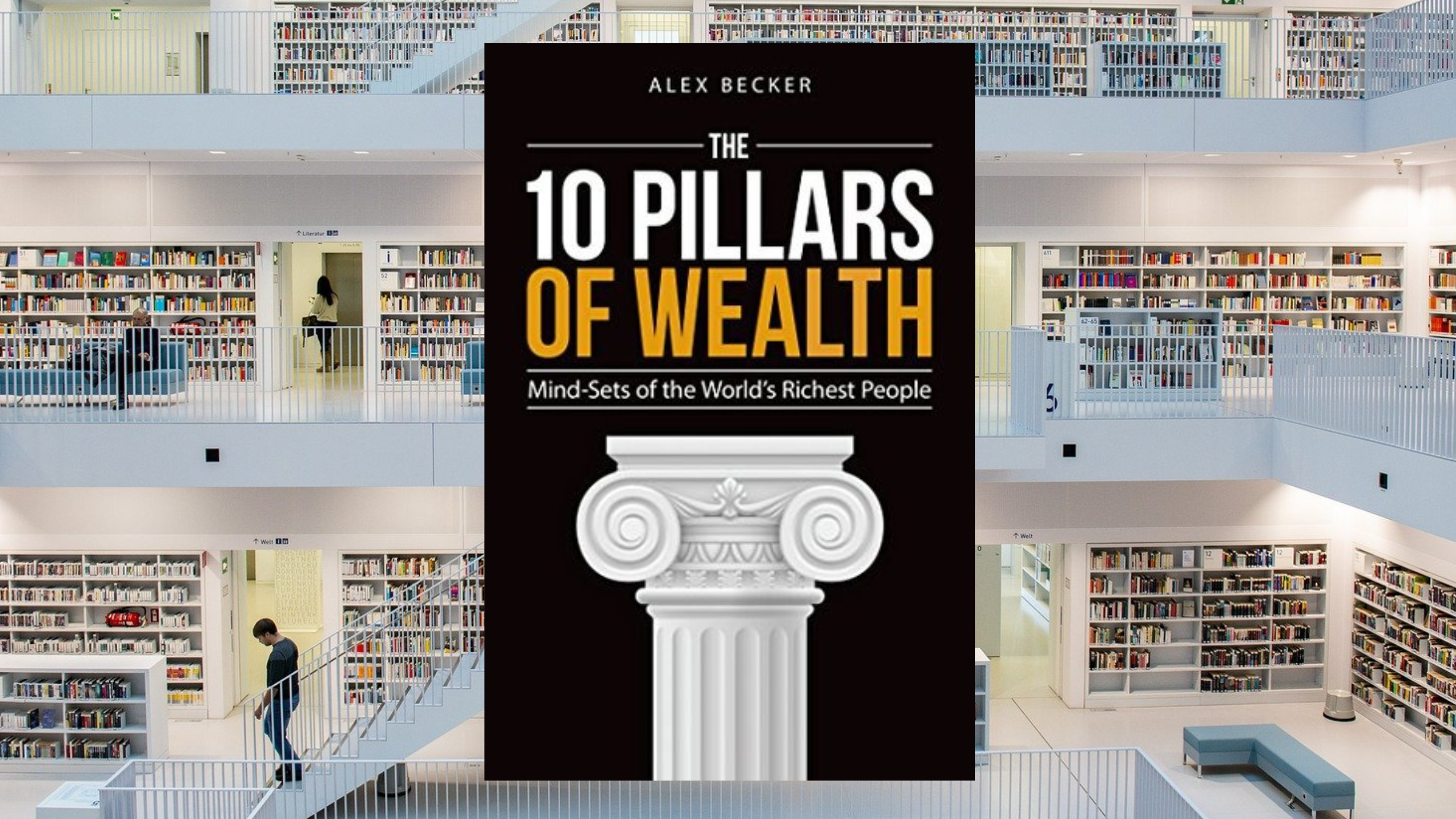
The 10 Pillars of Wealth, by Alex Becker:
The 10 Pillars of Wealth will help you cut through the noise and filter out the nonsense that stops most people from being successful. It's an excellent mix of powerful mindset shifts and extremely practical application that will elevate your business game above all of your competitors.
Not being wealthy has nothing to do with your intrinsic human worth, of course, but becoming wealthy is also not just going to happen by accident. You have to make it happen, you have to will it to happen, you have to align all your efforts and your thinking and your resources toward making it a reality, and it's books - and teachers - like these who can help you rise above the statistics and become rich.
Sample Quotes from the Book:
"By wanting to become wealthy, you are also saying that you want to accept the challenge to be better at making money than 99 percent of the people on this planet. Just by attempting this, you are going to have to accept the fact that you must not just be good, you must be incredible."
“People rarely become successful if they are comfortable in their current situation.”
“It might take you ten years, but if you never give up, you will have something to show for it.”
Read the Full Breakdown: The 10 Pillars of Wealth, by Alex Becker

The View from the Opposition:
No one's ideas are beyond questioning. In this section, I argue the case for the opposition and raise some points that you might wish to evaluate for yourself while reading this book.
#1: Assuming You Already Have Something Decreases Your Motivation to Go Out and Get It
Dr. Hardy has written a great book - there's no doubt about that. One thing I would take (slight) issue with though is his emphasis on believing that what you want to have an be in the future is already on its way to you.
On the surface, it just looks like what he's talking about in Step #3: going from needing, to wanting, to knowing. Which is fine, as far as it goes, but I would be careful to watch your motivation if you follow this advice.
Often, when we believe that something is a sure thing, or that we already have something, it reduces our internal motivation to out and get it. We think, "Great, it's already on its way to me, I don't have to do anything," when in fact, thinking this way halts the whole process.
I think a middle ground is good here. Start believing that "Yes, what I want is on its way to me...as long as I keep doing everything I need to do in order to make it happen." That way you're not giving away your own agency and you're keeping your motivation high.
"The test of a first-rate intelligence is the ability to hold two opposed ideas in the mind at the same time and still retain the ability to function.”
-F. Scott Fitzgerald

Questions to Stimulate Your Thinking:
#1: "Who will your Future Self be?"
#2: "Are you today the exact same person you were ten years ago?"
#3: “Given your current context, what is the absolute most important thing you could achieve or realize right now?"
#4: "What is the next level that would be utterly amazing to achieve?"
#5: "What are your three highest priorities at this stage in your life?"
#6: "How am I holding myself back from becoming my Future Self?"
#7: "Would my Future Self be proud of how I acted this day?"

Action Steps:
So you've finished reading. What do you do now?
Reading for pleasure is great, and I wholeheartedly support it. However, when I'm reading for a particular purpose, I am intensely practical. I want a result. I want to take what I've learned and apply it to my one and only life to make it better!
Because that's really what the Great Books all say. They all say: "You must change your life!" So here, below, are some suggestions for how you can apply the wisdom found in this breakdown to improve your actual life.
Please commit to taking massive action on this immediately! Acting on what you've learned here today will also help you solidify it in your long-term memory. So there's a double benefit! Let's begin...
In the Key Ideas section, we've already discussed how you can apply these seven Steps to your life, so I won't rehash them here. But the list is below, and you can review the Key Ideas above for specific suggestions for implementation.
STEP #1: Clarify Your Contextual Purpose
STEP #2: Eliminate Lesser Goals
STEP #3: Elevate from Needing to Wanting to Knowing
STEP #4: Ask for Exactly What You Want
STEP #5: Automate and Systemize Your Future Self
STEP #6: Schedule Your Future Self
STEP #7: Aggressively Complete Imperfect Work

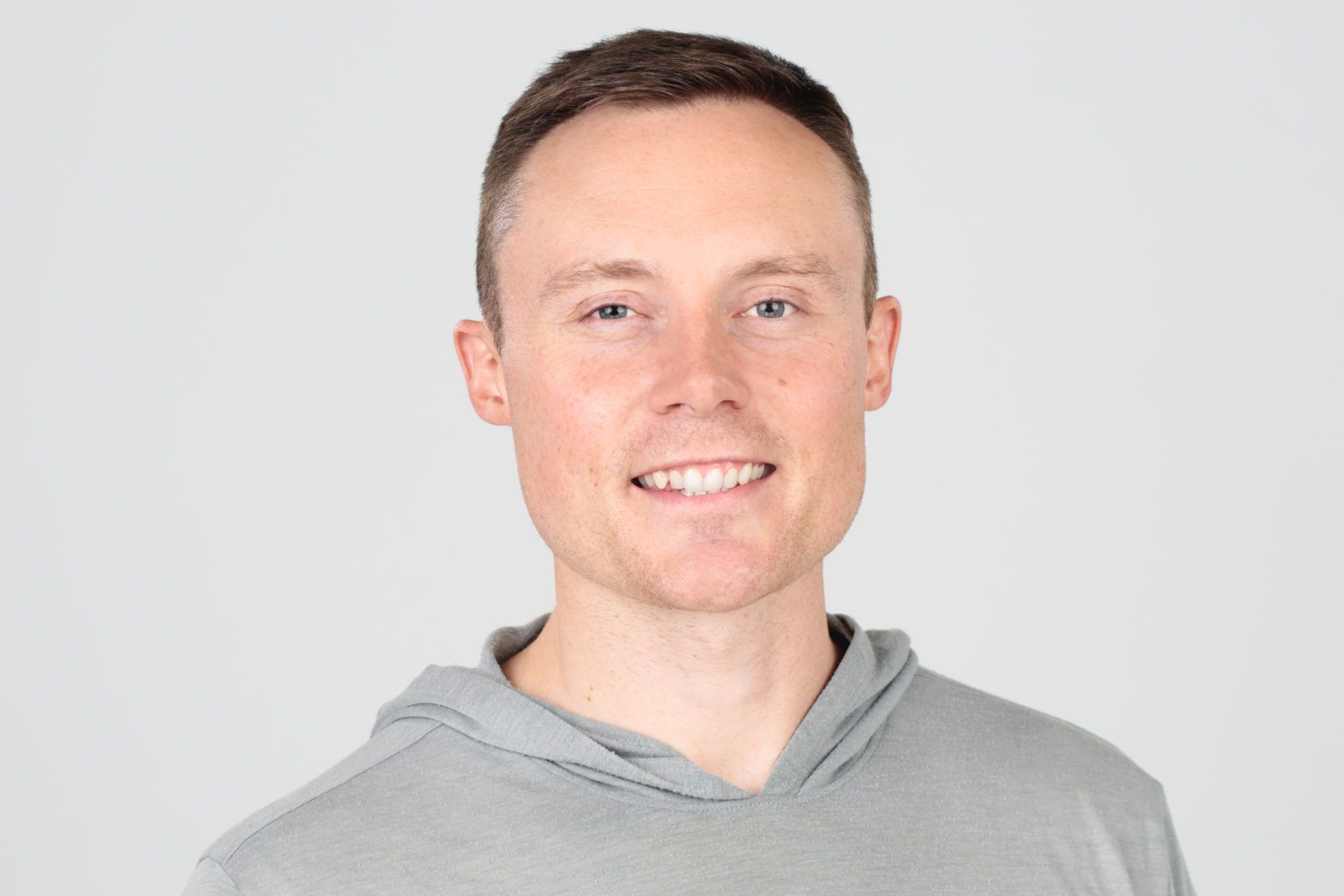
About the Author:
Dr. Benjamin Hardy is an organizational psychologist and bestselling author of Personality Isn‘t Permanent, and Willpower Doesn’t Work. His blogs have been read by over 100 million people and are featured on Forbes, Fortune, CNBC, Cheddar, Big Think, and many others. He is a regular contributor to Inc. and Psychology Today and from 2015-2018, he was the #1 writer, in the world, on Medium.com.
Additional Resources:
Write a Letter to Your Future Self - Plus a Bonus Training
Start Connecting with Your Future Self - Plus a Bonus Training
Get the Free 7 Threats Checklist - Plus a Bonus Training
Get the Free 7 Truths Checklist - Plus a Bonus Training
Get the Free 3 Priorities Checklist - Plus a Bonus Training
Apply the 7 Steps to Your Life - Plus a Bonus Eighth Step
Access the Future Self Imagination Tool
This Book on Amazon:
Be Your Future Self Now, by Dr. Benjamin Hardy
If You Liked This Book:
Who Not How, by Dan Sullivan and Dr. Benjamin Hardy
The Gap and the Gain, by Dan Sullivan and Dr. Benjamin Hardy
Your Next Five Moves, by Patrick Bet-David
The Four-Hour Workweek, by Tim Ferriss
